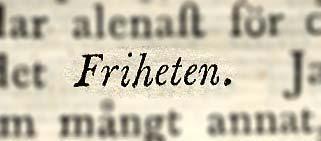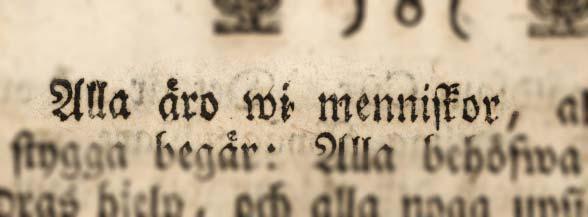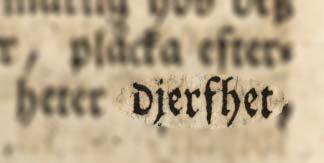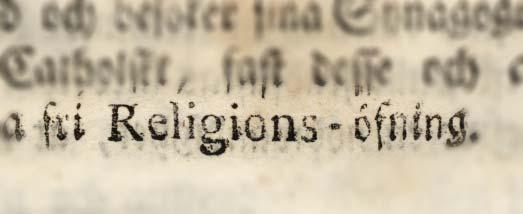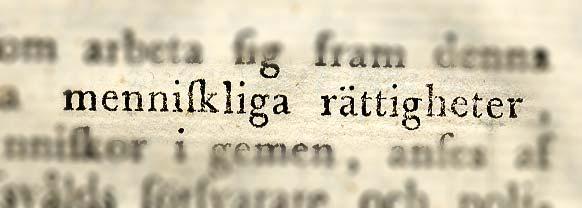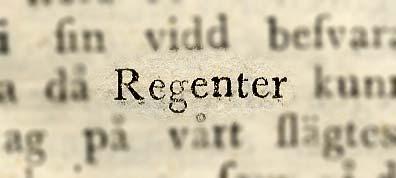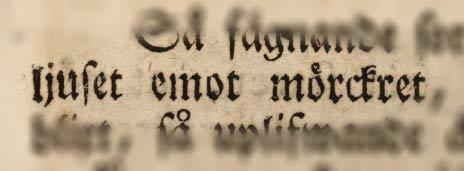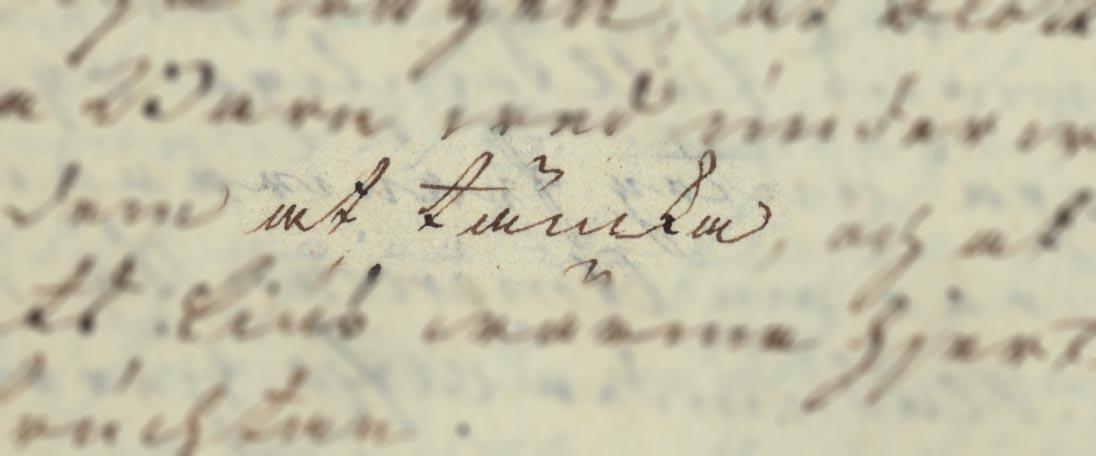About freedom of trade
Prejudice
…put aside all preconceived ideas; do not imagine liberty in one branch of industry alone, for then you will not get far before you meet with resistance and confusion; in your mind, free the state at once from all the fetters and regulations that confine it; let the example of others convince you of its feasibility, and allow yourself time to consider the matter properly; then you will soon see how free enterprise abroad and at home revives the smallest branch of trade, prevents foreigners from fleecing the country and one citizen from enriching himself at the expense of another; how security for the farmer in the possession of his land and freedom to exercise a craft and make a living as he wishes leads him imperceptibly and without legal regulation to the livelihood that brings him and the country the greatest reward: how crafts and manufactures, when free, inspire the worker to diligence and moderation, when he is not dependent on the inferior work of some badly paid journeymen and is busy getting ahead of others by industriousness and good workmanship; how all the trades combined, when free, move people to the right places, where they are most useful to themselves and the whole country: and finally how no political laws in the world have been able to correctly regulate this, which nature achieves so easily and effortlessly.
The Source of Our Country’s Weakness (1765), p. 21–22. Translated by Peter C. Hogg.
Restrictions lead to perdition
In contrast to that, Sweden has believed that financial and commercial secrets, exclusive privileges, bounties, constraints, and a variety of prohibitions would bring us prosperity. We have now struggled with all this for a long time and have finally come to the point that, without pestilence and war, we have become underpopulated; without commercial liberties, the commissioning agents of foreigners; without bad harvests, hungry; and with the greatest of mines, destitute of coin.
The Source of Our Country’s Weakness (1765), p. 6. Translated by Peter C. Hogg.
The equilibrium of free enterprise
This is not to be understood in such a manner, that each individual would not in Nature have his own will, which well may be in conflict with that of the State; but the Balance that will be reached among the various Trades, upon their liberation, will prevent the Tradesmen from damaging others and their Country to the extent of what commonly occurs.
Humanity can in this respect fully be compared to the Sea, where one Column of Water with tremendous pressure affects Another, but is countered by an equal Counter-pressure, resulting in a surface which is even and horizontal – all this without any Barriers or Hindrances for the separate Columns, nor any complex Arraignments.
Reminders of Remarks on the writing called The National Gain (Ärhindringar wid anmärkningarne öfwer skriften, kallad: Den nationnale winsten, 1765, § 99, s. 159–160).
Demand and supply
Commodities are never produced unless they are needed and in demand. The needs reveal themselves; they are manifold and thus automatically bring into being occupations and products that are then sold to those who require them. If those who need to buy a commodity are prevented from doing so, it remains in the hands of its producer, becomes a burden to him, and is branded with a black stamp that reads: Wasted sweat and toil.
The National Gain (1765), § 21, p. 21. Translated by Peter C. Hogg.
Individual and national gain
For fallen humanity it was a punishment that they should live by the sweat of their brows, yet it was so arranged that nature itself imposed it, as they were obliged by necessity to do so, having nothing to rely on for their needs but their own hands; and the toil was lightened by covetousness, as they realized that they could acquire what they needed thereby.
Should either of these be lacking, the fault ought to be looked for in the laws of the nation, though not actually in any defect in those, but in the obstacles that are placed in nature’s way.
If these laws render citizens incapable of feeding themselves and their children, they and their offspring must either die or abandon their native country. The more opportunities that the laws provide for some to live on the toil of others and the more obstacles that are placed in the way of others’ ability to support themselves by their labour, the more will industriousness be stifled, and the nation cannot but reflect the mould in which it is cast.
If that is the case, I intend to base the following hypothesis on it, namely, that each individual will of his own accord gravitate towards the locality and the enterprise where he will most effectively increase the national profit, provided that the laws do not prevent him from doing so.
Each individual pursues his own advantage. That inclination is so natural and necessary that every society in the world is based on it: otherwise laws, penalties and rewards would not even exist and the whole human race would perish completely within a short space of time. That work is always best rewarded that is of the greatest value and that most sought after that is best rewarded.
The National Gain (1765), 4–5, p. 6–7. Translated by Peter C. Hogg.
Basic truths in trade
I rest my argument on two axioms concerning commerce. The first is that the more buyers turn up in a market, the higher the price that the seller receives for his commodity, and vice versa. The other is that a commodity never costs as much when I am compelled to offer it for sale as when the buyer is obliged to search for it.
The Source of Our Country’s Weakness (1765), p. 14. Translated by Peter C. Hogg.
Sensible people
One thus sees sensible people who improve themselves in their natural simplicity in devious ways by laying snares around their own and others’ necks and fading away in the happiest of countries.
The Improvement of Finnish Agriculture (Svar på K. Finska Hushållningssällskapets prisfråga om det finska landtbrukets upphjälpande, 1799, § 30, p. 596). Translated by Johan von Willebrandt and Viveka Malmberg-Elliot.
Trade spreads prosperity
As far as trade is concerned, it is particularly remarkable that it requires the greatest speed, and therefore does not tolerate the very smallest obstacle or force, when it collects money and possessions in all directions for someone who, with care and diligence, initiates trading, and it also spreads prosperity to the most remote districts and thereby creates living conditions for thousands of new individuals in places where once ghosts and wild beasts dwelt, and here it is only the own profit that sets the largest wheels in motion without applying any other measures.
The Improvement of Finnish Agriculture (Svar på K. Finska Hushållningssällskapets prisfråga om det finska landtbrukets upphjälpande, 1799, § 31, p. 597). Translated by Johan von Willebrandt and Viveka Malmberg-Elliot.
Statute number 1
A single measure, namely that of being able to reduce the number of our regulations, has ever since then become an absorbing subject of research for me, which I would most highly recommend as the principal and most significant one to consider before any new ones are now promulgated.
The National Gain (1765), § 33, p. 35. Translated by Peter C. Hogg.
The stream
When the stream is allowed to run evenly, every drop of water is in motion. When there are no obstacles in the way, every worker competes for his livelihood and thereby increases the profit to the nation. By means of regulations, people are concentrated in certain groups, the opportunities to move into industry are reduced and a small number of people within each group rise above the majority, whose well-being is presented as evidence of the prosperity of the whole kingdom.
The National Gain (1765), § 15, p. 16. Translated by Peter C. Hogg.
Needs
Human beings feel well when they possess their necessities and comforts, which are referred to in common parlance as goods. It is nature that generates these, but they never become useful to us without labour.
The needs are manifold, and no one has ever been able, without the help of others, to acquire the minimum of necessities, while there is hardly a nation that has no need of another. The Almighty Himself has made our species such that we ought to cooperate. Should such mutual assistance be obstructed within or beyond a nation, it is contrary to nature.
The National Gain (1765), § 2, p. 4. Translated by Peter C. Hogg.
The National Gain
This concept of the national profit, as critical as it may seem of our new arrangements, is really in itself the most innocuous and simple one.
It provides freedom for all lawful occupations, though not at the expense of others. It protects the very weakest trade against oppression and promotes industriousness and unhampered enterprise.
It weighs them all in the same scales, making profit the true yardstick for deciding which of them should be preferred.
It spares the Sovereign Power a thousand bothersome concerns, regulations and supervisory duties when private and national profit merge into a single interest, and the injurious self-interest, which always tries to conceal itself behind one regulation or another, can then most effectively be controlled by mutual competition.
It guarantees a Swede the enjoyment of his most precious and greatest natural right, granted to him as a human being by the Almighty, namely, to earn his living by the sweat of his brow in the best way he can.
It removes the bolster of indolence from those who are now, because of their privileges, able to sleep away two-thirds of their time. All means of living without working are blocked, and none but the diligent is able to prosper.
It will effect a desirable reduction in our lawsuits. The many regulations, their expositions, exemptions and applications, which in any way inhibit trades, will then become pointless and fade away, and once a law has been repealed it can no longer be infringed.
The National Gain (1765), § 31, p. 32–33. Translated by Peter C. Hogg.
Life without statutes
They appear to believe that the Almighty was incapable of establishing humankind on earth with the ability to survive, multiply itself and live on earth unless they were to maintain the economic life of our species by means of privileges, guild regulations, bounties, overseers and bailiffs.
Benefits for oneself and self-interest
Individual happiness and individual advantage is the true, the effective motive force in the activities of all free people, whereas knocks and blows are really appropriate to slaves. He is a wise ruler who recognizes the need to remove from acquisitiveness the aristocratic fetters in which the self-interest of some has confined them, but a great one if he has the ability to do so.
The blood circulation of trade
Trade is too sensitive a factor for a country, which must be looked after with extreme care, but trade is nowhere near as strange as people make it. It does not consist mainly of secrets and not at all of many strange regulations and conditions nor of many edicts and prohibitions. Nature is always natural and simple. When blood is allowed to flow freely in all the veins according to their size and functions, then the body is at its best, but if too much blood is forced into the heart and lungs in order to make them stronger, then they suffer from their blood, other limbs wither away and the body is in danger of fatal stings and an incurable issue of blood.
Refutation of the Reasons Employed to Deny the Towns in Ostrobothnia and Västerbotten as Well as in Västernorrland a Free Navigation (Wederläggning af de skäl, hwarmed man söker bestrida öster- och wästerbotniska samt wäster-norrländske städerne fri seglation, 1765, § 52, p. 50–51). Translated by Johan von Willebrandt and Viveka Malmberg-Elliot.
Work has no limits
The Creator only put people to work, but did not stipulate the type of work each of them should do. Stealing was the only thing that the Almighty prohibited, but no target was set for diligence, how far it was allowed to go or what sort of things such diligence produced. He did not tie anyone to the plough nor did He tie anyone to trade guilds but merely when and where each one perceived how best to make a living where he could better himself.
The Improvement of Finnish Agriculture (Svar på K. Finska Hushållningssällskapets prisfråga om det finska landtbrukets upphjälpande, 1799, § 4, s. 569). Translated by Johan von Willebrandt and Viveka Malmberg-Elliot.



